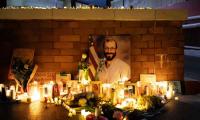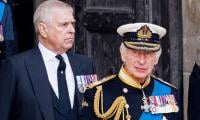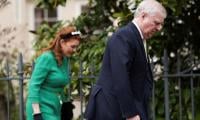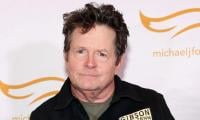Swept by the tides of holy patriotism
Islamabad diary
As high and unbeatable comedy, few things come close to the Islamic Republic in o
By Ayaz Amir
July 12, 2013
Islamabad diary
As high and unbeatable comedy, few things come close to the Islamic Republic in one of its bouts of patriotic frenzy, this time on account of the Abbottabad Commission Report. The high-voltage rage to be seen is proving infectious and certainly has most of the media in its grip.
"Incompetence and negligence" are the two watchwords of the report and those caught by the patriotic fever are using them as ammunition against everything in sight, chiefly the ISI and the army command. How could it happen? The Sheikh Osama invisible for so long and the Americans undetected as they came over the mountains and assaulted his hideout.
There is, however, a fine line between embarrassment and humiliation. We reserve our anger for the assault and are somewhat coy about the Sheikh's presence in Abbottabad. But the real embarrassment was his presence and if, in our minds, we can get over that, no point in dwelling too much on the loss of national honour in the American assault.
East Pakistan's loss was humiliation but we got over that in near-record time and today only a faint memory remains. The aftermath of Kargil was a humiliation...we got beaten with the stick of 'cross-border terrorism'. But we moved on.
No doubt, the commission has done a good job of pointing out the lessons to be learned from the Abbottabad affair. But to tear out our hair, as some media wiseacres are doing, is to miss the larger picture.
Osama was a burning priority for the Americans and they kept looking for him, even when his trail got cold. He was not such a burning priority for us, not because the army and the ISI were playing any kind of double game but because, given the state of the nation and the blowback from America's Afghan adventure, for many people in Pakistan the Sheikh Osama was not a villain but a hero. By the same token, for many people the Americans were not friends but enemies.
This was not the reason for going slow on Osama. But caught as the army and the ISI were in so much else, they were not about to leave everything to one side and hunt for the Sheikh's footprints.
Contrast this with the investigations into the two assassination attempts on Musharraf. There were few clues but both the cases were cracked and the perpetrators caught...primarily because everything the army, the ISI and the MI had was put into the investigations, Gen Kayani, as 10 Corps Commander, meticulously (and I am not using the word lightly) overseeing this massive effort. The army's interest was involved, hence the concentration of effort and focus.
Because of 9/11 and the Twin Towers coming down – the US mainland never attacked before except in 1812 when the British carried out an attack on Washington – the Americans felt something visceral about Osama bin Laden, Ayman al-Zawahiri, Khalid Sheikh Mohammad (in whose mind originated the idea of 9/11). Our feelings were qualitatively different, as they remain up till now, despite the mayhem we suffer because of our Taliban and Al-Qaeda wars.
And let's not forget, Pakistan is one of the easiest countries on earth to get lost in. Every major Al-Qaeda catch – Abu Zubaydah, al-Libbi, Ramzi bin al-Shibh, and the biggest of all, Khalid Sheikh Mohammad, happened in Pakistan. Not because Pakistan was complicit with Al-Qaeda but because those were the wages of our Afghan involvement (starting from 1978-79).
We became the base, the rear-headquarters of that 'jihad', little anticipating that in time we would become, in some ways even more than Afghanistan, its central theatre. Not only did the Sheikh move over to Pakistan. Much of the rest of the Al-Qaeda leadership did so as well, the Haqqani militia, the foreign fighters, all with the same address in North Waziristan. So Osama's finding a refuge in Pakistan is less strange than it sounds.
When the Sri Lankan team was attacked in Lahore, mercifully missing their target, the attackers easily melted away into the density of Lahore. Were any caught? Not to my imperfect knowledge. Salmaan Taseer's son is kidnapped from the heart of Lahore – easy as cake. Yousaf Raza Gilani's son (where is he?) picked up after he has just addressed an election meeting. Do we have any idea of what's happening in the interior of Balochistan, or for that matter in Quetta or Karachi? The infrastructure of turmoil, in no place on earth more fully developed than in the Islamic Republic.
Intelligence failure, of course. Call it colossal, even mind-boggling. But if we could only retain some perspective, it wasn't a bigger failure than Americas' own failure to detect anything about the run-up to 9/11.
In a section of the CIA there was some chatter about Osama bin Laden and an attack that he may have been preparing. This was in the spring and summer of 2001. President Bush was told about Al-Qaeda once or twice but he just wasn't interested, had never heard of Al-Qaeda and said that he couldn't be expected to swat every fly. Condoleeza Rice had her eyes trained on Moscow, her academic specialty, just as our defence forces had their eyes trained on India, not in their wildest dreams imagining that a stealth attack could come from over the Hindukush Mountains.
The Americans, after the fall of the Soviet Empire, were also caught up in hubris. Recall Karl Rove's astonishing admonition to a New York Times journalist: "...We're an empire now, and when we act, we create our own reality...We're history's actors...and you, all of you, will be left to just study what we do." The US was brought to earth by – although I hate saying this – Osama bin Laden and Al-Qaeda. In the immediate aftermath of 9/11 the American official mood, the thinking in the White House, was so full of arrogance that it almost sounds unreal ten, twelve years later.
The one percent Cheney doctrine, that if there was even a one percent chance of a potential, future danger to the US, the US had a right to act in any way it thought fit, including the use of force. No empire before had spoken this language.
And if that arrogance stands tempered and mitigated, if that tough talk stands eroded, it is because of three factors: the Sunni resistance to the American occupation in Iraq; the Taliban resistance in Afghanistan; and Iran's refusal to succumb to American threats.
The irony of it all...the US post-9/11 had sought to stamp out radical Islam. Today radical Islam, and Al-Qaeda, are stronger than it was a decade ago. The civil war in Syria, and the incipient civil war in Egypt, point to a picture of which Chairman Mao would have approved: there is great disorder under the heavens and the situation is excellent...excellent for Islamic radicals, and the theoreticians of Al-Qaeda.
Sad to say but 9/11 was not a one-off affair – from the point of view of Al-Qaeda, it was a strategic masterstroke, plunging our contemporary world into turmoil and marking the decline of the US from the preeminent, all-conquering position it enjoyed after the breakup of the Soviet Union.
America is still an empire but after Iraq and Afghanistan, a more sober empire. America's determination to pull out of Afghanistan – they are now even talking of the zero option, no troops at all after 2014 – is a reflection of this sobriety.
The ghost of Bin Laden perhaps laughing soundlessly in the kingdom of the shades, and we scarcely aware of what awaits us... as, to the roll of muffled drums in the distance, another chapter in our colourful history begins to unfold.
Email: winlust@yahoo.com
As high and unbeatable comedy, few things come close to the Islamic Republic in one of its bouts of patriotic frenzy, this time on account of the Abbottabad Commission Report. The high-voltage rage to be seen is proving infectious and certainly has most of the media in its grip.
"Incompetence and negligence" are the two watchwords of the report and those caught by the patriotic fever are using them as ammunition against everything in sight, chiefly the ISI and the army command. How could it happen? The Sheikh Osama invisible for so long and the Americans undetected as they came over the mountains and assaulted his hideout.
There is, however, a fine line between embarrassment and humiliation. We reserve our anger for the assault and are somewhat coy about the Sheikh's presence in Abbottabad. But the real embarrassment was his presence and if, in our minds, we can get over that, no point in dwelling too much on the loss of national honour in the American assault.
East Pakistan's loss was humiliation but we got over that in near-record time and today only a faint memory remains. The aftermath of Kargil was a humiliation...we got beaten with the stick of 'cross-border terrorism'. But we moved on.
No doubt, the commission has done a good job of pointing out the lessons to be learned from the Abbottabad affair. But to tear out our hair, as some media wiseacres are doing, is to miss the larger picture.
Osama was a burning priority for the Americans and they kept looking for him, even when his trail got cold. He was not such a burning priority for us, not because the army and the ISI were playing any kind of double game but because, given the state of the nation and the blowback from America's Afghan adventure, for many people in Pakistan the Sheikh Osama was not a villain but a hero. By the same token, for many people the Americans were not friends but enemies.
This was not the reason for going slow on Osama. But caught as the army and the ISI were in so much else, they were not about to leave everything to one side and hunt for the Sheikh's footprints.
Contrast this with the investigations into the two assassination attempts on Musharraf. There were few clues but both the cases were cracked and the perpetrators caught...primarily because everything the army, the ISI and the MI had was put into the investigations, Gen Kayani, as 10 Corps Commander, meticulously (and I am not using the word lightly) overseeing this massive effort. The army's interest was involved, hence the concentration of effort and focus.
Because of 9/11 and the Twin Towers coming down – the US mainland never attacked before except in 1812 when the British carried out an attack on Washington – the Americans felt something visceral about Osama bin Laden, Ayman al-Zawahiri, Khalid Sheikh Mohammad (in whose mind originated the idea of 9/11). Our feelings were qualitatively different, as they remain up till now, despite the mayhem we suffer because of our Taliban and Al-Qaeda wars.
And let's not forget, Pakistan is one of the easiest countries on earth to get lost in. Every major Al-Qaeda catch – Abu Zubaydah, al-Libbi, Ramzi bin al-Shibh, and the biggest of all, Khalid Sheikh Mohammad, happened in Pakistan. Not because Pakistan was complicit with Al-Qaeda but because those were the wages of our Afghan involvement (starting from 1978-79).
We became the base, the rear-headquarters of that 'jihad', little anticipating that in time we would become, in some ways even more than Afghanistan, its central theatre. Not only did the Sheikh move over to Pakistan. Much of the rest of the Al-Qaeda leadership did so as well, the Haqqani militia, the foreign fighters, all with the same address in North Waziristan. So Osama's finding a refuge in Pakistan is less strange than it sounds.
When the Sri Lankan team was attacked in Lahore, mercifully missing their target, the attackers easily melted away into the density of Lahore. Were any caught? Not to my imperfect knowledge. Salmaan Taseer's son is kidnapped from the heart of Lahore – easy as cake. Yousaf Raza Gilani's son (where is he?) picked up after he has just addressed an election meeting. Do we have any idea of what's happening in the interior of Balochistan, or for that matter in Quetta or Karachi? The infrastructure of turmoil, in no place on earth more fully developed than in the Islamic Republic.
Intelligence failure, of course. Call it colossal, even mind-boggling. But if we could only retain some perspective, it wasn't a bigger failure than Americas' own failure to detect anything about the run-up to 9/11.
In a section of the CIA there was some chatter about Osama bin Laden and an attack that he may have been preparing. This was in the spring and summer of 2001. President Bush was told about Al-Qaeda once or twice but he just wasn't interested, had never heard of Al-Qaeda and said that he couldn't be expected to swat every fly. Condoleeza Rice had her eyes trained on Moscow, her academic specialty, just as our defence forces had their eyes trained on India, not in their wildest dreams imagining that a stealth attack could come from over the Hindukush Mountains.
The Americans, after the fall of the Soviet Empire, were also caught up in hubris. Recall Karl Rove's astonishing admonition to a New York Times journalist: "...We're an empire now, and when we act, we create our own reality...We're history's actors...and you, all of you, will be left to just study what we do." The US was brought to earth by – although I hate saying this – Osama bin Laden and Al-Qaeda. In the immediate aftermath of 9/11 the American official mood, the thinking in the White House, was so full of arrogance that it almost sounds unreal ten, twelve years later.
The one percent Cheney doctrine, that if there was even a one percent chance of a potential, future danger to the US, the US had a right to act in any way it thought fit, including the use of force. No empire before had spoken this language.
And if that arrogance stands tempered and mitigated, if that tough talk stands eroded, it is because of three factors: the Sunni resistance to the American occupation in Iraq; the Taliban resistance in Afghanistan; and Iran's refusal to succumb to American threats.
The irony of it all...the US post-9/11 had sought to stamp out radical Islam. Today radical Islam, and Al-Qaeda, are stronger than it was a decade ago. The civil war in Syria, and the incipient civil war in Egypt, point to a picture of which Chairman Mao would have approved: there is great disorder under the heavens and the situation is excellent...excellent for Islamic radicals, and the theoreticians of Al-Qaeda.
Sad to say but 9/11 was not a one-off affair – from the point of view of Al-Qaeda, it was a strategic masterstroke, plunging our contemporary world into turmoil and marking the decline of the US from the preeminent, all-conquering position it enjoyed after the breakup of the Soviet Union.
America is still an empire but after Iraq and Afghanistan, a more sober empire. America's determination to pull out of Afghanistan – they are now even talking of the zero option, no troops at all after 2014 – is a reflection of this sobriety.
The ghost of Bin Laden perhaps laughing soundlessly in the kingdom of the shades, and we scarcely aware of what awaits us... as, to the roll of muffled drums in the distance, another chapter in our colourful history begins to unfold.
Email: winlust@yahoo.com
-
 Macaulay Culkin Pens Emotional Tribute To 'Home Alone' Mum Catherine O'Hara
Macaulay Culkin Pens Emotional Tribute To 'Home Alone' Mum Catherine O'Hara -
 Rob Cesternino Shares Learning Essential Skills During Time On 'The Traitors'
Rob Cesternino Shares Learning Essential Skills During Time On 'The Traitors' -
 South Carolina Teen Arrested After Altercation With Mother Outside High School
South Carolina Teen Arrested After Altercation With Mother Outside High School -
 Estranged Husband Kills Wife In Florida Murder-suicide Hours After Leaving Jail
Estranged Husband Kills Wife In Florida Murder-suicide Hours After Leaving Jail -
 Kylie Kelce Plays Coy Over Travis, Taylor Swift Wedding Plans: 'Not Gonna Lie'
Kylie Kelce Plays Coy Over Travis, Taylor Swift Wedding Plans: 'Not Gonna Lie' -
 US Opens Civil Rights Probe Into Alex Pretti Shooting: Report
US Opens Civil Rights Probe Into Alex Pretti Shooting: Report -
 Prince William, Kate Middleton Decide Next Step For Prince George
Prince William, Kate Middleton Decide Next Step For Prince George -
 Catherine O’Hara: Home Alone Actress Dies After 'brief Illness'
Catherine O’Hara: Home Alone Actress Dies After 'brief Illness' -
 Princess Anne Refuses An Offer Made At Palace
Princess Anne Refuses An Offer Made At Palace -
 'The Rookie's' Mekia Cox Reveals Her Daughter's Debut In Season 8
'The Rookie's' Mekia Cox Reveals Her Daughter's Debut In Season 8 -
 King Charles Faces Challenge Over 'disgraced' Andrew's New Home
King Charles Faces Challenge Over 'disgraced' Andrew's New Home -
 Bianca Censori 'tried' To Walk Away 'a Number Of Times' From Kanye West Marriage: Source
Bianca Censori 'tried' To Walk Away 'a Number Of Times' From Kanye West Marriage: Source -
 Halle Berry Reveals Why She Stayed 'alone' Before Meeting Boyfriend Van Hunt
Halle Berry Reveals Why She Stayed 'alone' Before Meeting Boyfriend Van Hunt -
 'A Knight Of The Seven Kingdoms' Peter Claffey Makes Rare Comment About Costar Dexter Sol Ansell
'A Knight Of The Seven Kingdoms' Peter Claffey Makes Rare Comment About Costar Dexter Sol Ansell -
 Sarah Ferguson's Friend Opens Up About Former Duchess Of York Mental Health
Sarah Ferguson's Friend Opens Up About Former Duchess Of York Mental Health -
 Claudia Oshry Shares Key Reason Behind Her Exit From 'The Masked Singer' Season 14
Claudia Oshry Shares Key Reason Behind Her Exit From 'The Masked Singer' Season 14



